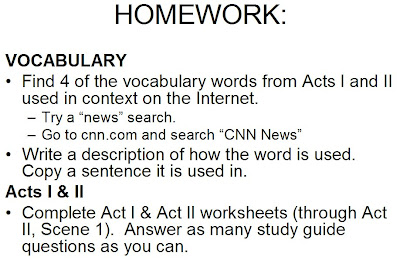- worked together to put events from Act I in order.
- finished reading Act II.
- worked together to answer Act II questions/worksheets.
- were given a test review for the test over Acts I & II on Wednesday, May 6.
- were given vocabulary practice (below) they should complete in order to prepare for the test.
- were directed to BBC version of Acts I and II (below)
Vocabulary Practice Recommendations (Students should do these for the words they are most uncomfortable with.)
•A) Share word webs: –Work with a partner to create more word webs or to combine all of yours.
•B) Create a cinquain or acrostic for the words that are most difficult for you. The poem must relate to the meaning of the word! –This is an individual assignment!
•C) Find pictures that relate to the words that are most difficult for you. Write sentences explaining how the pictures relate to the words.
–This is an individual assignment!






.bmp)